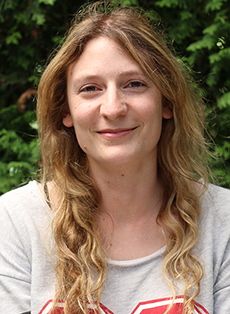
Evolution and Sexual Conflict Group
Institute for Evolution and Biodiversity
Hüfferstrasse 1
D-48149 Münster, Germany
Tel.: +49 251/83-21654
canaldom@uni-muenster.de
Nationality: Spanish
Education
- Since 2018:
PhD studies in the Evolution and Sexual Conflict Group, Institute for Evolution and Biodiversity, University of Münster, Germany - 2014 - 2015:
Master of Science in High Energy Physics, Astrophysics and Cosmology (M.Sc.), Universitat Autònoma de Barcelona, Barcelona, Spain - 2009 - 2014:
Bachelor of Science in Biology (B.Sc.), University of Girona, Girona, Spain
Supervisors
- Dr. Claudia Fricke, Evolution and Sexual Conflict Group, Institute for Evolution and Biodiversity, University of Münster
- Prof. Dr. Stefan Schlatt, Centre of Reproductive Medicine and Andrology, University of Münster
- Prof. Dr. Klaus Reinhardt, Applied Zoology lab, Technische Universität Dresden
Research interests
PhD project description
Reproduction in a changing world
Organisms can face many different stressors in their surrounding environment. One of the most important environmental stressors for several organisms is temperature. Especially ectotherms, are strongly influenced by this factor, as their body temperature and biological processes are directly affected by the environmental temperature. At the population level, temperature also determines their abundance and distribution. Their ability to cope with temperature variation and particularly high temperatures is at the heart of this project. I will focus on reproductive performance and think this question is a matter of special interest and is currently gaining importance due to climate change.
Changes in body temperature produces changes in performance and fitness, and at more extreme temperatures, the often-observed reduction of reproduction potential can be crucial for species persistence. For this reasons, I first want to investigate in this project the negative effects of extreme temperatures on reproduction success. Secondly, I want to understand whether adaptation to this stressor allows a species to maintain its reproductive potential. It is widely known that some species become sterile at high and cold extreme temperatures, and even though this phenomenon is documented for some species (e.g. Drosophila), it is not well studied. Interestingly, it has also been shown that this is a reversible process, as flies can recover fertility after being transferred to milder temperatures.
Following this direction, three main points will be addressed in this project. First, I want to know how high temperatures affect fertility of different Drosophila species and how their temperature sensitivity differs. Second, I want to determine if flies can adapt and expand their fertility range and thus, remain fertile even at high temperatures. This will allow us to see if adaptation is possible or if this constraintlimits their persistence and reproductive success. Finally, I want to understand the molecular mechanisms of temperature-induced sterility. I will combine experimental evolution with molecular studies and phenotypic assays to tackle these questions. In this way, I will study how high temperatures affects male reproductive tissues, like the accessory glands and sperm functionality and morphology. Female fecundity will be also tested, to understand sex-specific responses to high temperatures and to what extent they differ between sexes and affect fitness.

